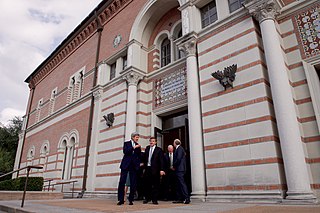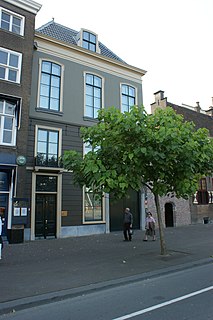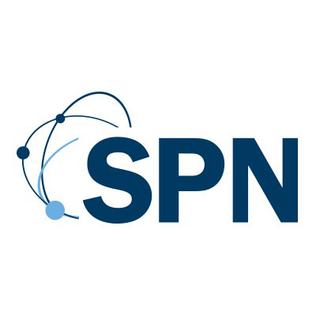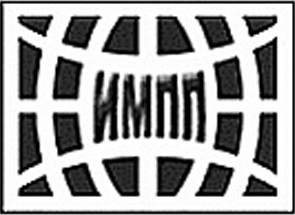The National Institute for Research Advancement (NIRA) is a Japanese independent policy research think tank based in Tokyo founded in 1974 under the National Institute for Research Advancement Act. It is funded through an endowment comprising capital contributions and donations from public and private sectors.
Its objective is to conduct independent research to contribute to the resolution of contemporary complex social issues in many areas, including politics, economics, international affairs, society, new technologies, and administration.
It maintains a World Directory of Think Tanks .
A think tank, or policy institute, is a research institute that performs research and advocacy concerning topics such as social policy, political strategy, economics, military, technology, and culture. Most think tanks are non-governmental organizations, but some are semi-autonomous agencies within government or are associated with particular political parties, businesses or the military. Think-tank funding often includes a combination of donations from wealthy individuals and personal contributions, with many also accepting government grants.

The Institute for Public Policy Research (IPPR) is a progressive think tank based in London. It was founded in 1988 and is an independent registered charity. IPPR has offices in Newcastle, Manchester, and Edinburgh. Funding comes from trust and foundation grants, government support, and individual donors. The think tank aims to maintain the momentum of progressive thought in the United Kingdom through well-researched and clearly argued policy analysis, reports, and publications; as well as a high media profile.
Mizuho Information & Research Institute, Inc. is a Japanese information technology company that “provides assistance to corporations in increasing their corporate value through its consulting, system integration and outsourcing service.” As of 2017 it had 4700 employees. The Institute was formed by the merging of DKB Information Systems, Fuji Research Institute Corporation, and IBJ Systems Ltd. on October 1, 2004.

Rice University's Baker Institute for Public Policy, also known as the Baker Institute, is an American think tank on the campus of Rice University in Houston, Texas. Founded in 1993, it functions as a center for public policy research. It is named for James A. Baker, III, former United States Secretary of State, Secretary of the Treasury, and White House Chief of Staff. It is directed by Ambassador Edward P. Djerejian and funded mainly by donor contributions, endowments, and research grants.
Sir Antony George Anson Fisher, nicknamed AGAF, was a British businessman and think tank founder. He participated in the formation of various libertarian organisations during the second half of the twentieth century, including the Institute of Economic Affairs and the Atlas Network. Through Atlas, he helped establish up to 150 other institutions worldwide.

Atlas Network, formerly known as the Atlas Economic Research Foundation, is a non-governmental 501(c)(3) organization based in the United States that provides training, networking and grants for libertarian and free-market groups around the world. Atlas Network has about 500 partner organizations in nearly 100 countries.
The International Policy Network (IPN) was a think tank based in the City of London, founded 1971, and closed in September 2011. It was a non-partisan, non-profit organization, but critics said it was a "corporate-funded campaigning group". IPN ran campaigns on issues such as trade, development, healthcare and the environment. IPN’s campaigns were pro-free market.
The Washington Institute for Near East Policy is an American think tank based in Washington, D.C., focused on the foreign policy of the United States in the Near East. The institute's mission statement says that it seeks "to advance a balanced and realistic understanding of American interests in the Middle East and to promote the policies that secure them."
The Australian Institute of International Affairs (AIIA) is an Australian private research institute which focuses on International relations. It publishes the Australian Journal of International Affairs. It is one of the oldest active private research institutes in Australia. The AIIA has held the highest Australian ranking in the Global Go-To Think Tank Index's "Best Independent Think Tank" category since ranking began in 2016.

The Urban Institute is a Washington, D.C.–based think tank that carries out economic and social policy research to "open minds, shape decisions, and offer solutions". The institute receives funding from government contracts, foundations and private donors. The Urban Institute measures policy effects, compares options, shows which stakeholders get the most and least, tests conventional wisdom, reveals trends, and makes costs, benefits, and risks explicit. The Urban Institute has been referred to as "independent" and as "liberal". In 2020, the Urban Institute co-hosted the second annual Sadie T.M. Alexander Conference for Economics and Related Fields with The Sadie Collective in Washington D.C.
The Sustainable Development Policy Institute (SDPI) provides the global sustainable development community with representation from Pakistan as well as South Asia as a whole. The Institute's mission is: "To catalyse the transition towards sustainable development, defined as the enhancement of peace, social justice and well-being, within and across generations". The think tank is based in Islamabad, Pakistan. The Lauder Institute of University of Pennsylvania ranks it at number 15 among research institutes in Southeast Asia and the Pacific region.

The Manohar Parrikar Institute for Defence Studies and Analyses (MP-IDSA), New Delhi, is India's foremost think tank for advanced research in international relations, especially defence, strategic and security issues, and providing training to civilian, military and paramilitary officers of the Indian government. It is funded by the Indian Ministry of Defence but operates as a non-partisan and autonomous body. It aims to promote national and international security by carrying out research on defence and security-related issues and disseminating the knowledge among the policy-makers and wider public.

The Kiel Institute for the World Economy is an independent, non-profit economic research institute and think tank based in Kiel, Germany. In 2017, it was ranked as one of the top 50 most influential think tanks in the world and was also ranked in the top 15 in the world for economic policy specifically. German business newspaper, Handelsblatt, referred to the Institute as "Germany's most influential economic think tank", while Die Welt, stated that "The best economists in the world are in Kiel".

The Scientific Council for Government Policy is an independent think tank of the Government of the Netherlands based in The Hague, whose members include prominent social scientists, economists and legal scholars.

The Energy and Resources Institute (TERI) is a research institute in New Delhi that specializes in the fields of energy, environment and sustainable development. Established in 1974, it was formerly known as the Tata Energy Research Institute. As the scope of its activities widened, it was renamed The Energy and Resources Institute in 2003.

The State Policy Network (SPN) is a nonprofit organization that serves as a network for conservative and libertarian think tanks focusing on state-level policy in the United States. The network serves as a public policy clearinghouse and advises its member think tanks on fundraising, running a nonprofit, and communicating ideas. Founded in 1992, it is headquartered in Arlington, Virginia, with member groups located in all fifty states.
The International Centre for Policy Studies (ICPS) is an independent NGO, founded in 1994 which aims to promote public policy concepts and practice and apply them to influential policy research that affects both the public and private sectors in Ukraine.

The Institute for National Security Studies (INSS) is an independent Israeli research institute and think tank affiliated with Tel Aviv University dealing in areas of national security matters such as military and strategic affairs, terrorism and low intensity conflict, military balance in the Middle East, and cyber warfare.

The Institute of International Politics and Economics is one of the oldest research institutes in South Eastern Europe specialised in the field of international relations. It is headquartered in Belgrade, Serbia. Since it was established in 1947, the Institute of International Politics and Economics has had a special place in the academic life of the country. From a small group of researchers who laid foundations of the Yugoslav science of international relations, the Institute has gradually turned into the largest scientific institution in the country and one of the most reputable research and Para-diplomatic centres in the world. The Institute studies the processes and phenomena in the field of international politics and economics, this also including legal aspects of international relations, which are of interest for the position and foreign policy of the State.